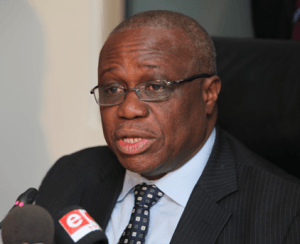Bank of Ghana maintains policy rate at 26%, says inflation slowing

The Bank of Ghana has maintained its policy rate at 26 per cent, citing a slowdown in inflation as a result of its tight monetary policy stance.
Inflation last October stood at 17.4 per cent and rose to 17.6 per cent in November and 17.7 per cent at the end of December.
The monetary policy committee of the central bank, says core inflation (excluding energy and utility prices) is increasing at a slower rate and that is now expected to steer inflation towards the medium target band of about 12 per cent in 2016 and 8±2 per cent by 2017, barring any unanticipated shocks.
After approving a disbursement of $114.6 million, the International Monetary Fund (IMF) on January 13, said that the Bank of Ghana should be prepared to tighten monetary policy if inflationary pressures do not reduce.
However, Dr Henry Kofi Wampah, Governor of the Bank of Ghana, told journalists: “We are looking at current conditions and we think that the conditions don’t demand an increase at this time,” he said.
Dr Wampah said though the outlook on inflation remains positive, there are risks to the outlook including ripple effects of the recent unanticipated petroleum price adjustments, exchange rate developments and worsening external financing conditions.
“These risks would however be moderated by lower crude oil prices, and improvements in the energy situation”, he said.
The Governor said despite risks to economic growth from the tight monetary and fiscal policy stance, weak consumer confidence, low commodity prices and global growth, Ghana’s growth is expected to recover in the medium term from improvement in energy supply and the macroeconomic environment, and the increase in petroleum production.
Economic growth for November 2015 was lower compared with the same period in 2014, according to the central bank’s Composite Index of Economic Activity (CIEA) for November 2015.
The committee says fiscal consolidation remains on track. The Cedi, it said, depreciated by 15.7 per cent against 31.3 per cent in 2014, and the budget recorded a cash deficit of 5.6 per cent in the first eleven months of 2015, against a target of 6.8 per cent.
There are also however, external risks to fiscal consolidation by way of low growth prospects in China and other emerging market economies, a negative outlook on the commodities market and the gradual normalization of US monetary policy.
By Emmanuel Odonkor
